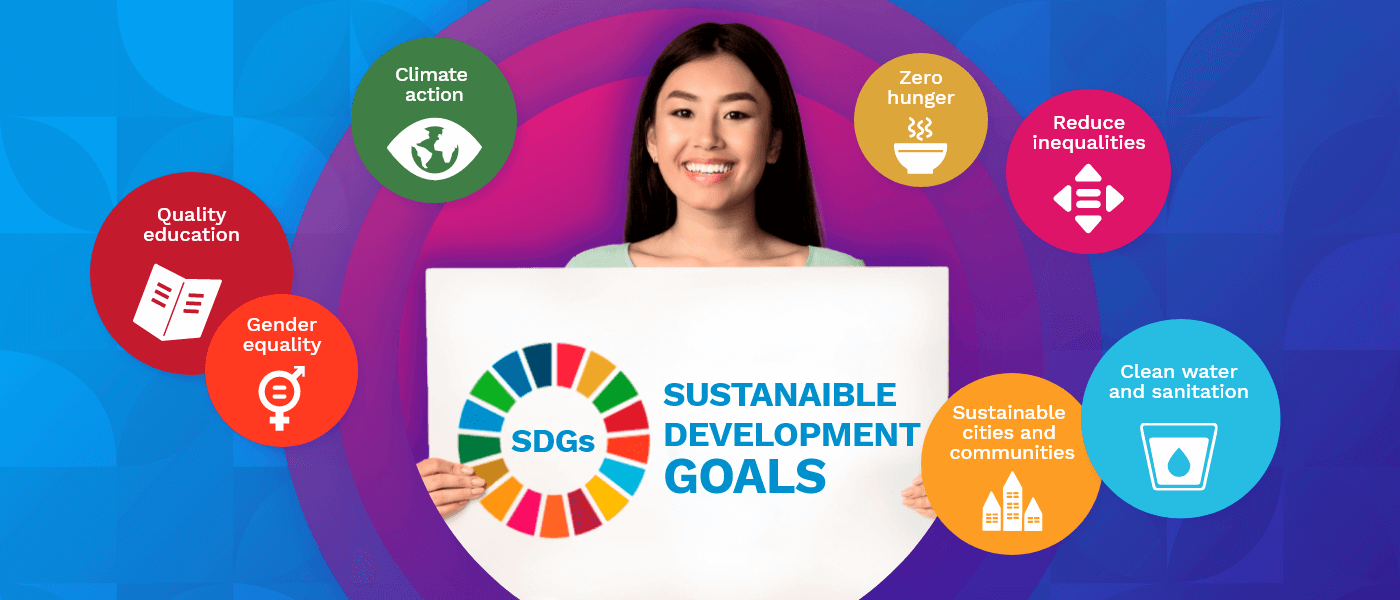
CASE STUDY
How Amara NZero built a culture around ESG goals
July 25, 2023

Table of contents
Just a few decades ago, finding the word “sustainability” among a company’s objectives was uncommon. But, in recent years, more and more companies have begun to embrace sustainability and commit to their contribution to the environment.
Traditional business models that prioritize economic interests above all else have become mostly a thing of the past. Customers no longer value a company solely based on its products or services but instead, also look to its environmental impact to form their opinion.
Consequently, the corporate sustainability model has become a priority for large and small organizations. In this article, we explain what corporate sustainability is and share some strategies to support it.
Sustainability refers to meeting present needs without compromising future ones and implementing a business model that is responsible with resources. In other words, as part of its strategy, a company should take into account the social, economic, and environmental factors which are impacted by its activities.
A sustainable company cares about creating social and economic value through its actions, contributing to the development of future generations. These companies prioritize environmental concerns and implement measures to reduce their global impact, such as reducing energy consumption, promoting the circular economy, and adopting the 3R approach: Reduce, Reuse, and Recycle.
Sustainable companies create long-term value through their products while ensuring that these products and the processes involved in creating them don’t negatively impact society or the environment. To achieve this, three fundamental pillars are essential in any corporate sustainability plan:
There are many benefits to corporate sustainability, some of the most notable for companies include:
As consumers’ ecological and environmental awareness increases, companies recognized for practicing corporate sustainability are better perceived. Positive ratings on environmental, social, and governance (ESG) criteria are associated with improved public image and results.
Ethics and corporate sustainability play a significant role for Gen Z and Millennials when choosing between employers as proven by Deloitte in its Gen Z and Millennial Survey 2022, where 46% of Millennials and Gen Z’s claim to have rejected a job based on their personal ethics. This survey also shows that employees who are satisfied with the social and environmental considerations of their company are more likely to still work there for a period of longer than 5 years.
Implementing sustainable initiatives leads to the creation of more durable products or services. Sustainable practices can enhance the efficiency of processes and reduce resource consumption, resulting in long-term cost savings.
Companies integrating sustainability strategies can mitigate risks related to environmental regulations, resource scarcity, and changes in consumer preferences. Participation in sustainable strategies helps companies comply with regulations like the Sustainable Development Goals and ESG criteria.
Companies that achieve sustainability become more profitable, efficient, and better positioned in the market. To achieve this, implementing the following strategies is essential:
All companies aspiring to be sustainable should start with these steps. The 3R approach involves giving materials or products a second life and minimizing resource usage in everyday actions.
The 17 Sustainable Development Goals (SDGs) in the 2030 Agenda aim to transform the world and encompass challenges such as poverty, inequality, climate, and environmental degradation. Aligning your company’s culture with the SDGs is crucial. If you want to know how to translate the SDGs into your corporate culture, we recommend taking a look at this article.

The path to sustainability involves assessing and being aware of the environmental, social, and economic impact of your company’s operations and products. Identifying key areas for improvement will help develop an action plan with defined goals, such as reducing carbon emissions, using natural resources more efficiently, or engaging in social projects.
Working with like-minded partners or suppliers makes it easier to develop sustainable practices throughout the supply chain, from materials to energy, tools, and transportation.
The key to a company’s success in sustainability lies in having all employees committed to the objectives. Sustainability training sensitizes employees to environmental issues and sustainable actions to effect real change.
Innovation and technology are essential when it comes to finding creative solutions to the challenges associated with sustainability. Technology plays a vital role in improving energy efficiency for example, through monitoring and control systems, while innovation in areas like solar and wind energy enables companies to produce energy in a more sustainable way.
Circular economy practices are another example where advanced recycling and material recovery technologies, along with the adoption of reusable products and services, showcase how innovation and technology contribute to sustainability.
Lastly, digital solutions significantly enhance people’s quality of life, both professionally and personally, by improving energy efficiency, employee well-being, sustainable development, and inclusion.
If you’re wondering how to transform your company into one with a sustainability-centered strategy, the answer is simple: isEazy Skills! Achieve your Sustainable Development Goals through an app that provides training, measurement, assessment, and gamification to make sustainability a reality in your company. Try it for free!
Corporate sustainability refers to a company’s ability to operate responsibly concerning the environment, society, and the economy, ensuring efficient resource use without compromising future generations. It is crucial because it not only benefits the planet but also enhances a company’s reputation, increases competitiveness, and attracts consumers and employees who value sustainability commitments.
Companies that adopt corporate sustainability strategies improve their public image and gain a competitive advantage. They also reduce long-term costs by optimizing resource use and minimizing waste. Additionally, sustainability-driven companies attract and retain talent, as younger generations prefer to work for organizations with strong environmental and social values. Another key benefit is regulatory compliance, as many current regulations require sustainable practices to operate in specific industries.
There are several strategies to enhance sustainability in a company. Applying the 3R principle (Reduce, Reuse, Recycle) helps minimize environmental impact and maximize resource efficiency. Incorporating the Sustainable Development Goals (SDGs) into corporate culture ensures that operations align with global sustainability objectives. Additionally, collaborating with sustainable suppliers and training employees in responsible practices are essential for effective transformation. Educating the workforce about sustainability is crucial for fostering awareness and encouraging eco-friendly habits within and beyond the workplace.
Technological innovation plays a crucial role in corporate sustainability. Solutions such as energy monitoring systems and the use of renewable energy sources help reduce carbon footprints. The circular economy, supported by advanced recycling technologies and business models focused on reuse, is transforming how companies manage resources. Digital tools like isEazy Skills assist businesses in measuring their sustainability impact, training employees on eco-friendly practices, and implementing effective sustainability strategies through education, measurement, and gamification, ensuring sustainability becomes a core part of corporate culture.
WHITEPAPER
Not sure where to start with ESG?
Download our whitepaper to discover how to align your business with the Sustainable Development Goals.
Download whitepaper



